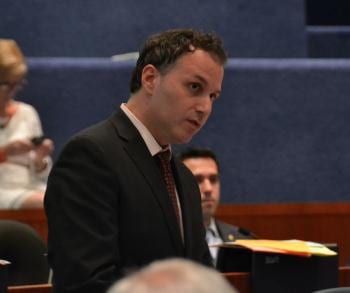
Councillor Josh Colle. Credit: Andrea Houston
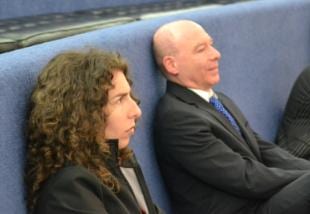
Kulanu's Justine Apple and Martin Gladstone watch the vote. Credit: Andrea Houston
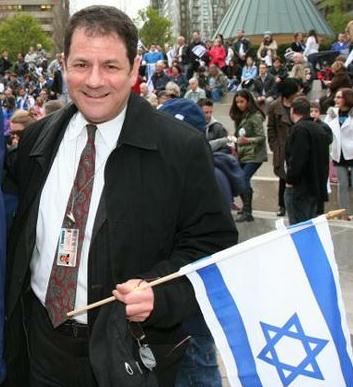
Councillor James Pasternak. Credit: jamespasternak.ca
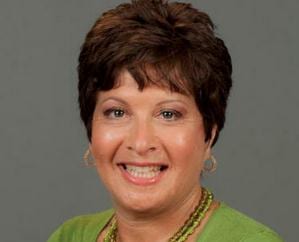
Toronto Sun columnist Sue-Ann Levy. Credit: Courtesy photo
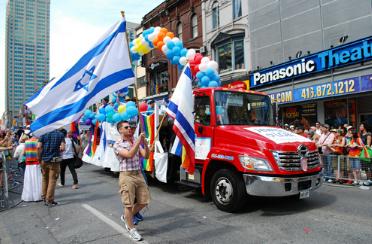
Kulanu, a Toronto-based gay Jewish group, marches in the 2011 Pride parade. Credit: Andrea Houston
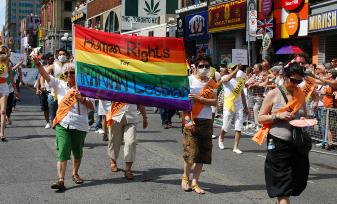
A group marches for "Iranian lesbians" at Pride 2011. Credit: Andrea Houston
UPDATE – Fri, June 8: Pride Toronto funding is safe for another year, but the city has now officially condemned the phrase “Israeli apartheid.”
Toronto city councillors voted on a two-part motion on June 7, a last-minute compromise put forward by Councillor James Pasternak, who remains determined to ban the phrase from all city-funded events.
The first part of the motion, condemning the phrase “Israeli apartheid,” passed by a vote of 26 to 7. The second part, which passed 33 to 0, saved Pride Toronto’s $123,807 cultural grant for 2012.
Justine Apple, executive director of Kulanu, a gay and lesbian Jewish group in Toronto, says she plans to file a complaint with Pride Toronto’s dispute resolution committee in the next few days.
“I’m ecstatic,” she says. “I think it’s wonderful that the term ‘Israeli apartheid’ has been condemned. Now QuAIA [Queers Against Israeli Apartheid] is going to be a marginalized group, as they should be because they create a toxic environment at Pride and alienate the people of Toronto.”
Meanwhile, QuAIA spokesperson Tony Souza says it’s “absurd” that the city has condemned a phrase that is internationally recognized as accurate criticism of the Israeli government. He says he welcomes a complaint.
“We are calling attention to the human rights of Palestinians,” he says. “Time and time again we have said the same thing. We are not breaking any laws.”
Martin Gladstone, who has been fighting QuAIA for three years and was sitting with Apple for the vote, says that from now on, QuAIA is under “a cloud of condemnation” with the city. He balked when asked if he plans to file a complaint as well. “I don’t think anyone in their right mind would use the complaint process. It’s really for elected officials.”
Pride Toronto’s co-chair was quick to defend the dispute process, telling Gladstone that it’s a community-based legal arbitration panel for anyone who wishes to complain about any group marching in the parade.
Pasternak says he put forward a compromise. “We expressed our offence at the term ‘Israeli apartheid,’ and at the same time [we did not] punish an important economic and cultural event.”
“The next battleground,” he says, will be the executive committee meeting on June 12, where the city’s anti-discrimination policy may face changes. “Will the executive tighten it up to make sure there’s clarity?” He says the motion, “the condemnation,” provides clarity to the executive committee.
“We are suffering from Pride parade fatigue by this issue. We cannot keep coming back here year after year. This is a goodwill gesture. We explained that the term ‘Israeli apartheid’ is deeply offensive and demonizing.”
Pasternak would not elaborate on how the anti-discrimination policy would be applied to other beneficiaries of city funds, such as the Toronto International Film Festival, which may screen a film about Palestine.
“Look, QuAIA is a demonstration. We don’t fund demonstrations. Pride applied for money under our cultural grant policy.”
Councillors Kristyn Wong-Tam and Gord Perks grilled Councillor Josh Colle, asking why Pride has been singled out among all the organizations receiving grants.
“Why this term only? You’re not aware of any other offensive phrasing in any other festival? You’re not aware of any language that offends any community?” Perks said.
“No,” Colle responded.
Wong-Tam said anyone opposed to phrasing, like “Israeli apartheid,” should take their complaint through the proper legal channels, like the Ontario Human Rights Tribunal.
“You are asking this council to adjudicate on a matter council is not qualified to speak to,” she said.
City will continue to fund Pride
UPDATE – June 7, 5pm: Toronto city councillors have voted unanimously to maintain funding for Pride Toronto.
The vote passed 33-0 at city hall after an earlier motion was passed to condemn the phrase Israeli apartheid.
Xtra is following the story.
June 7 — 11am There is a very real chance Pride Toronto will lose its city funding during debate on June 7, warns Ward 27 Councillor Kristyn Wong-Tam.
The wording of the motion that a group of councillors is expected to put forward is not known, nor is the result. How the debate will unfold at Toronto City Council remains largely a mystery, she says.
Wong-Tam says Councillor James Pasternak is determined to ensure Queers Against Israeli Apartheid (QuAIA) does not march in the Pride parade. And if the group does march, he wants the city to deny Pride Toronto (PT) its $123,807 cultural grant, or at least hold back the funding until after the festival. Ultimately, Pasternak says, he would like to see the term “Israeli apartheid” banned from any event that receives city funding.
“I can tell you that Councillor Pasternak intends to move a motion,” Wong-Tam says. “He has been somewhat secretive on his motion. He has been holding his cards quite close to his chest. That may be so he has the element of surprise, or maybe he is conflicted as to what he should do.”
QuAIA has applied to march in the parade and is listed on the PT website among 160 registered groups.
Behind the scenes, lobbyists are urging councillors to support Pasternak’s motion. Just this week, Denise Alexander, the wife of Toronto Sun city hall columnist Sue-Ann Levy, distributed a DVD dubbed Why Is It Hate?
Xtra has obtained a copy of the DVD, which included a Toronto Sun column written by its filmmaker, Martin Gladstone, with large portions of the text underlined.
“Wasn’t [Alexander’s] wife, Sue-Ann, taken off the Pride beat last year because she was lobbying?” Wong-Tam asks.
Last year, Xtra obtained a copy of a letter by Levy that was sent to several leaders in the Jewish community encouraging them to “get the emails going” by lobbying Toronto city councillors to strip PT of funding, tagged with her official Toronto Sun signature.
The Sun punished Levy for her lobbying efforts by removing her from the Pride beat until after the council vote.
When contacted by Xtra June 6, Alexander confirmed that she distributed the DVD to councillors but refused to comment further, then hung up the phone.
Councillor Janet Davis says a member of deputy mayor Doug Holyday’s staff escorted Alexander around city hall. “[Alexander] left her information. I said, ‘Thank you very much,’ and that was the end of the conversation.”
The 55-minute video, produced by “Queer Films Corporation,” attempts to define “Israeli apartheid” as hate speech. Narrated by Gladstone, the film cuts back and forth between clips of Pride 2010 and 2011, deputations to the Toronto executive committee in June 2011 and shots of anti-QuAIA news clippings, most of which are columns by Levy, Jonathan Kay or Gladstone.
Councillor Gord Perks says he also got the DVD but tossed it in the trash. “I’m not interested in what message she is trying to give. Quite frankly, they are asking us to undermine one of the most important celebrations in Toronto and restrict freedom of speech, so I have no interest in looking at their materials.”
Several members of PT’s board, including co-chair Francisco Alvarez, have expressed concern that Pasternak may succeed in his bid to defund the festival. Board members have been meeting with councillors over the past two weeks to impress upon them the importance of the festival and explain the process involved in lodging a complaint against any group registered to march. Pasternak said they “agreed to disagree.”
Wong-Tam says PT is right to be worried. “They should be concerned. I’m concerned.”
Pasternak told Xtra in May that QuAIA’s presence makes the parade ineligible for funding. “We don’t fund demonstrations and we don’t fund groups that don’t comply with our anti-discrimination policy. The QuAIA messaging is extremely offensive. It is preposterous in historical fact.”
In 2010, council passed a motion requiring that groups participating in any Toronto festival comply with the city’s anti-discrimination policy. Last year, city manager Joe Pennachetti released a report that stated QuAIA’s participation in the parade did not violate the city’s anti-discrimination policy.
At the May 22 economic development committee meeting, more than $6 million in grants to 10 major Toronto arts organizations were approved, which includes funding for PT.
But Pasternak says the city manager’s report is not valid because he tacked on an amendment before the vote last year.
That’s incorrect, say councillors Wong-Tam, Perks and Shelley Carroll.
Councillor Adam Vaughan says the city needs to have a dialogue addressing the issues that QuAIA raises, but Pride funding should not be held for ransom until that happens. “I think we’re going to find a way to protect Pride,” he says. “Pride is a profoundly important community, political, cultural and social event in the city, and it requires the support of city council.”
Councillor Mike Layton says he hopes city council is not put in a position where money is taken away from PT. “Pride has done everything to ensure that it’s respectful of all the city’s policies, and hopefully that will come out in the debate.”
Wong-Tam says that if any restrictions are to be put on Pride Toronto, it should also extend to all festivals and beneficiaries of city funds.
“I think it should,” she says. “There is a sense of nervousness with our major cultural events right now. I challenge the councillors [supporting Pasternak] to tell me if they know every single film screened at the Toronto International Film Festival. Do they know all the participants marching and parading in Caribana? Do they know every single element of programming in Luminato? Or Nuit Blanche? I suspect that they don’t.
“No other organization or cultural producer in the city is being asked to go through this extra layer of scrutiny. It is grossly unfair to Pride Toronto to put these obstacles and qualifiers in front of them. The LGBT community is absolutely right to feel they are being singled out.”
Wong-Tam says Pasternak should take his dispute to the “proper legal channels,” such as the Ontario Human Rights Tribunal. “This issue is going to keep coming back up, year after year.”
Debate surrounding Pride funding is expected to begin around 2pm on June 7, she says.
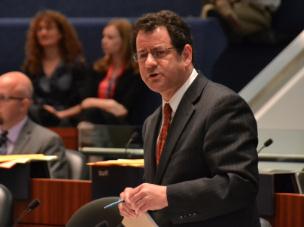
 Why you can trust Xtra
Why you can trust Xtra


